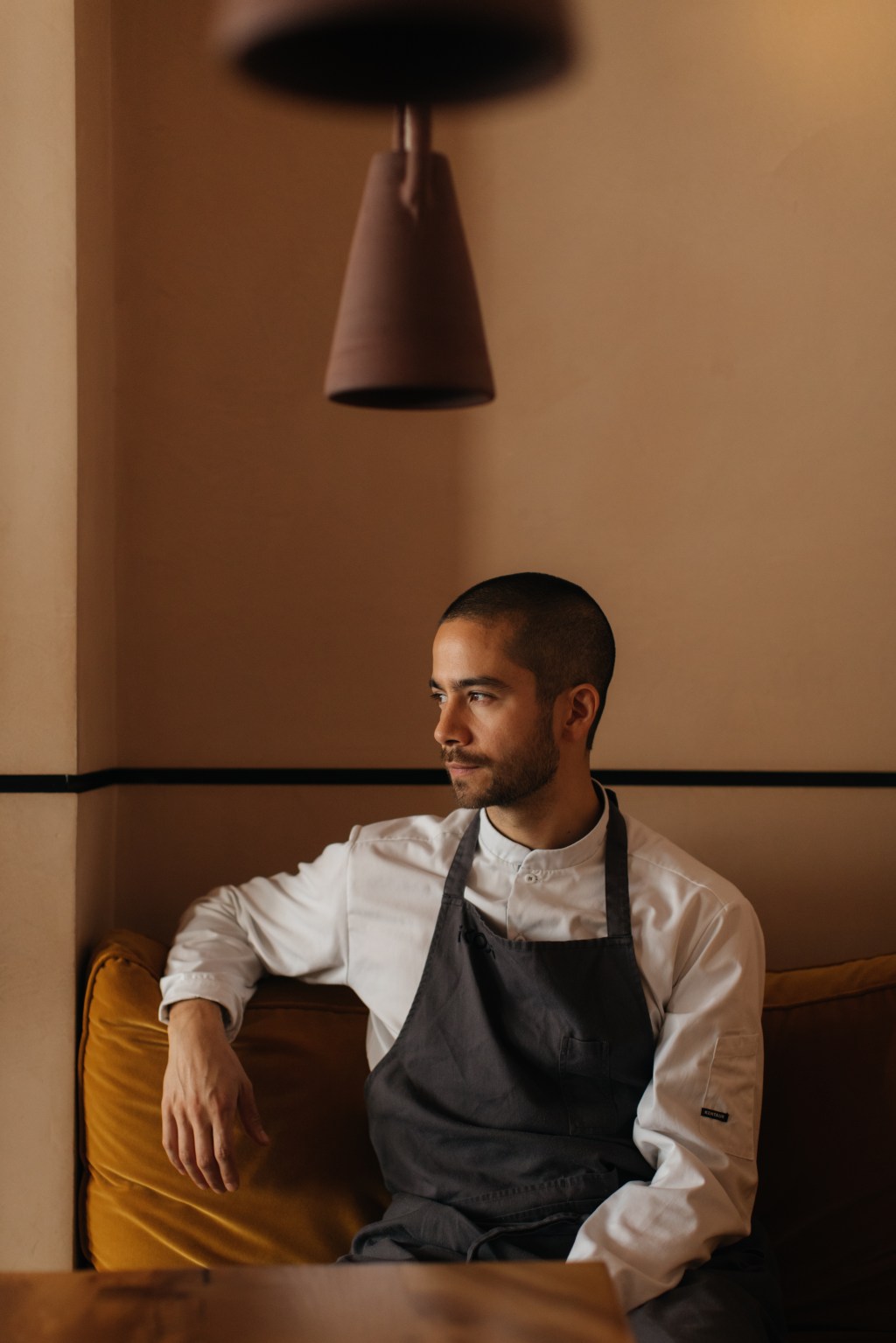Jeremy Chan, the creative mind behind the two-Michelin-star restaurant Ikoyi at 180 Strand in London, is ready to share his life story with his debut cookbook, “Ikoyi: a Journey Through Bold Heat With Recipes.”
In the book, the half-Chinese, half-Canadian chef offers an intimate look at his culinary adventure and the journey of opening and running Ikoyi with his childhood friend and now business partner Iré Hassan-Odukale.
Some 82 recipes are included in the cookbook, showcasing Chan’s mastery of the bold favors of West Africa and beyond, and of the fresh local produce the British Isles has to offer.
But Chen admits these recipes are “nearly impossible” to replicate at home because “cooking isn’t just about following a recipe. It’s a feeling, and there’s more than just the recipe. There are all the soft touches, and they are complex and very personal.
“My goal isn’t for people to recreate them. It’s not a recipe book for people to cook at home. The book is more about capturing a feeling and I want people to read the recipes and look at the dish and read the essay and get inspired by a specific aspect of it,” he adds.
“Like the dish with scallops, for instance. I talked about my love of the texture of scallops when they’re really fresh. Maybe someone would read that essay and go find the best scallops to find out what I meant about that texture of scallops. I guess if a reader can do that, then they’ve learned more about cooking,” he explains.

In a way the cooking method depicted in the book and implemented at Ikoyi mirrors Chan’s own multicultural, cross-continental upbringing, and at the core, it’s all about defying expectations and forging new identities.
A Princeton graduate, Chan worked as an analyst in Madrid before deciding to become a chef. After years of courtship with landlords, while doing pop-ups and catering gigs around London, Ikoyi finally opened on a narrow side street in St. James’s Market in 2017.
Billed as a West Africa-inspired eatery, it offered dishes that drew the admiration of food critics but infuriated those from the very region.
Chan writes in the book that “one of the fondest notes left by our esteemed guests were that we should get rid of ‘that Chinese cook’ and hire a real African chef, and claims that we’d served them rotten leftovers.”
Thankfully, London has no shortage of authentic African restaurants, and Ikoyi eventually found its place in the fine dining circle. It was awarded its first Michelin star in 2019, and two years later received an additional star. With a tasting dinner menu priced at 300 pounds, the restaurant now requires booking a month in advance.

While the sub-Saharan association — most notable in the use of local ingredients such as fermented locust beans, tiger nuts, and plantain — initially made Ikoyi stand out in London’s culinary scene, Chan says his exploration of spice and umami is no longer restricted by geographical boundaries.
In regard to what Ikoyi stands for now, Chan says, “If you compare Ikoyi to a fashion brand, the fashion brand has a style and an ethos that connects to the founder and its core values, aesthetic style, and way of tailoring, measuring and capturing a moment. That’s the same in my restaurant. It’s a specific perspective that I created. It’s stylistic, artistic and personal and it has a set of rules that are very unique to me, and they don’t have to be explained.
“I don’t look at things and think, oh, this is a Chinese ingredient, or this is a Nigerian ingredient. I think of the ingredients as abstract objects and I put them through the filter of my restaurant. That’s how I come up with something original, pure and unique,” he adds.

While he makes the comparison to a fashion brand, the fashion world clearly has recognized Ikoyi. Louis Vuitton recruited Chan to open a pop-up restaurant at its maison in Seoul, where he created a menu inspired by the French luxury brand’s “Art of Travel” ethos, while capturing the feeling of Korean flavors, seasonality and ingredients.
For lunch, he served fatty tuna toast and wild Korean green onion, Korean beef with green goddess salad dressing and crispy chili, and sugar-cured shrimp and black olive rice. The dinner menu included tartlet paired with namul, a classic Korean vegetable side dish, ginseng crème caramel with caviar and saffron, as well as cod with confit cabbage, and white kombu.
“That was a really cool thing to do because I didn’t grow up in Korea. I never lived there. I’ve never really eaten Korean cuisine. But I think it demonstrated my skill set, which is about getting to know what people like, condensing these ideas, feelings and tastes into my own creative output,” says Chan.
After the pop-up, Chan expresses the desire to be “grounded in London to regroup and refocus” on his restaurant, which relocated from the hustle and bustle of Piccadilly to the quieter and more creative Strand in January. The space was designed by Danish architect and designer David Thulstrup.

“I think our focus in the next year is probably going to be mainly on the restaurant itself. The beauty of Ikoyi is that it’s extremely exciting, dynamic, intense, very focused and concentrated, and it requires my maximum attention and focus with my team. Maybe in the future I will do more collaborations with brands, but I am not rushing into that,” he says
The area near 180 Strand is rapidly gaining momentum as a trendy hangout spot for the fashion and creative community since the opening of the member’s club 180 House in 2020. Dazed Media and Karla Otto’s offices are located in the building as well.
Chan says he can easily tell the fashion people apart from the usual fine diners, especially during previous catering services for brands such as Paul Smith, Prada and Alexander McQueen.
“The fashion crowd is very different. The occasion is what’s important. They’re not coming for the food. My experience with the fashion crowd is that you have to be quick. You have to make a bold statement with food if you want to get noticed,” he says, adding that the menu also will have to be vegetarian or vegan-friendly.



